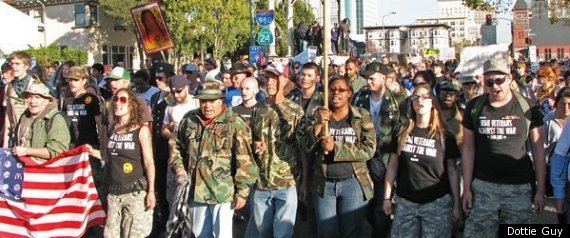 Unemployed for two years and still recovering from a war injury, Dottie Guy has just about blown through her life savings. While the Iraq veteran qualifies for disability payments, she has no idea when the agency will set a date for her hearing.
Unemployed for two years and still recovering from a war injury, Dottie Guy has just about blown through her life savings. While the Iraq veteran qualifies for disability payments, she has no idea when the agency will set a date for her hearing."I have no income right now and it's scary," Guy, 29, told the Huffington Post.
The former military policewoman is just one of about 2,000 disgruntled veterans who say they've risked their lives and well-being only to come home to a country that profits from their sacrifices. Iraq Veterans Against The War issued a statement Monday saying that they feel betrayed by the nation's leaders and will continue to join the Occupy Wall Street protests to broadcast their grievances.
"The VA services are abysmal," Guy said. "But yet the corporations who are making all this money from these wars are living high off the hog."
Veterans have found a natural sounding board in the Occupy movement. Faced with surging unemployment and a need for better health services, this vulnerable community has leveraged the protests to help galvanize, educate and empower veterans.
IVAW said that its membership has increased about 10 percent since Marine Corps veteran Scott Olsen was seriously injured at Occupy Oakland in October.
"Most veterans, when they get out, have found that the promises that were made to us were not followed through on," said Scott Kimball, secretary of the IVAW board of directors.
Kimball said he's been involved with the Occupy movement in Illinois since it began and helped organize the Veterans marches around the country that occurred on Nov. 2.
The wealth discrepancy between returning troops and corporations profiting from the war is a prime concern among veterans who have joined the Occupy movement. Guy has been among the 12.1 percent of veterans without jobs since 2009. Kimball, who served as an infantryman in Iraq from 2003 to 2007, went back to school after finding minimal employment opportunities.
"When you enlist, you're told that when you get out, your military experience will be regarded as a benefit for employment," Kimball remarked. "When I got out, I found that I wasn't very employable."
But money isn't the only thing on these protesters minds. Veterans are calling on the VA to do a better job in addressing and treating their medical issues.
Guy, for one, wants to arm returning troops with the information she didn't have.
When she came home from Iraq in 2003 with an injured ankle and severe anxiety, Guy was not aware of the military health services that were available to her. She relied on her job's health insurance to cover her surgery. It wasn't until her anxiety attacks became immobilizing that Guy learned that she could seek help from the VA.
"When I got home, we were just discharged and told to pretty much fend for ourselves," Guy remarked. "I didn't know about PTSD. I could've taken time off."
She wants returning vets to be immediately paired with a counselor who will outline the benefits and services available to them when they get home.
Guy has been pitching in at Occupy San Francisco, where she hands out literature and helps out in the kitchen. She said she's been building up a network of fellow veterans at the protests and among the IVAW community.
While volunteering with IVAW, Kimball has been advocating for veterans to get better health care. He has also been working to chip away at the stigma that’s associated with mental illness.
When Kimball returned from Iraq and was battling PTSD, he couldn't bear confronting it.
"I was scared to go to the VA," Kimball said. "I didn't want to be a messed up veteran."
As suicide, homelessness, joblessness and serious health concerns continue to wear on the veteran community, returning troops look to the stage at the Occupy protests to spread their message.
"This 99 percent message ... comes with responsibility to acknowledge and to lift the voices of marginalized communities, veterans being one of them," Kimball said. "We want to lend our leadership."
Origin
Source: Huff
Would you like to get more visitors from Washington DC?
ReplyDeleteSubmit your blog in zeole.com/washington_dc . This is a one time submission. This would automatically submit a preview of your future blog posts in Washington DC, with a link back to your blog.
Enjoy more traffic from DC :-)